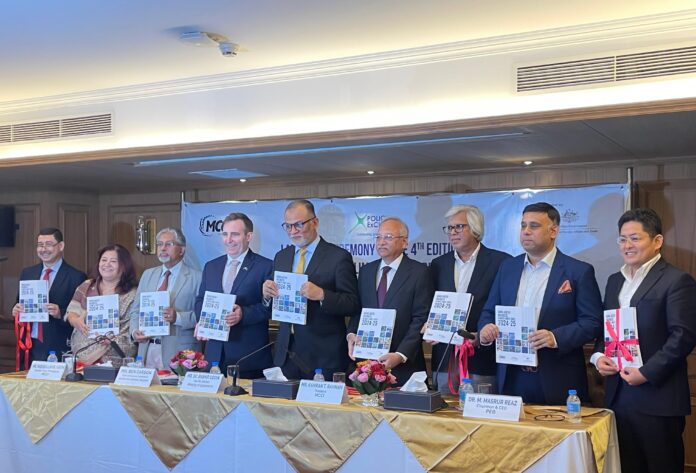Bangladesh’s business environment has seen little to no notable improvement over the past year, with conditions in several key areas actually deteriorating, according to the latest Business Climate Index (BBX) for FY2024–25.
The report shows that access to regulatory information, infrastructure facilities, labour regulation, trade facilitation, technology adoption, and environmental compliance have all worsened compared to the previous year.
The country’s overall score for FY2024–25 stands at 59.69, indicating that the country’s business climate remains challenging. Although the score has slightly increased from 58.75 in FY2023–24, the marginal rise of 0.94 points has not translated into a meaningful improvement in the operating environment.
According to the report, political instability, geopolitical uncertainty, rising production costs, investment uncertainty, high inflationary pressures, increased bank lending rates, and exchange rate volatility are among the major factors contributing to the challenging business environment in Bangladesh.
The overall score had dropped sharply in FY2023–24 after hovering above 61 points in the two preceding years.
The survey covered 12 key sectors — retail and wholesale trade, transport, construction, electronics and light engineering, leather and tannery, agriculture and forestry, real estate, food and beverages, pharmaceuticals and chemicals, ready-made garments, textiles, and financial intermediation.
The survey was carried out among 800 businesses including micro and small, medium and large categories from 8 divisions of them 650 businesses responded to the survey.
This is the fourth edition of the BBX survey, jointly conducted by the Metropolitan Chamber of Commerce and Industry (MCCI) and Policy Exchange Bangladesh (PEB), a private policy research organisation.
The initiative was supported by the Department of Foreign Affairs and Trade (DFAT) of the Australian Government.
The survey findings were unveiled on Thursday evening at an event at MCCI Gulshan office. Commerce Adviser Sk. Bashir Uddin was the Chief Guest of the event.
During the report presentation Masrur Reaz, founder chairman and CEO of policy exchange Bangladesh said the survey indicates that to improve business climate, the country requires immediate attention for reforms.
In this survey, the business environment score determines considering 11 key pillars – Starting a Business, Access to Land, Availability of Regulatory Information, Business Infrastructure, Labour Regulation, Dispute Resolution, Trade Facilitation, Paying Taxes, Technology Adoption, Access to Finance and Environment Regulations and Standard.
We found that Two major growth centres Dhaka and Chitagong controlling 58 per cent business of Bangladesh but they has no growth in the business environment score last couple of years.
Starting a new business remains a major challenge in Dhaka and Chitagong while Sylhet emerges as the top performer in the 4 out of 11 pillars while Barishal leads in 3 pillars.
Due to inflation, finance and policy uncertainty 78 per cent of firms report higher input costs particularly in RMG, pharmaceuticals and warehouse trade.
58 per cent firms has been facing financial constraints and 60 per cent struggle with long term planning amid inflation and monetary tightening, said Dr Reaz.
He said private sector has been facing different challenges but the government officials often acknowledge that to address that however they need urgent attention and reform measures.
He noted that the BBX would continue to assist the government with data and analysis to identify key areas for improving the business environment.
Addressing the event as the chief guest, Commerce Adviser Md Bashir Uddin said that high bank interest rates remain one of the major barriers to doing business in Bangladesh.
He expressed hope that lending rates are likely to come down early next year, easing pressure on the private sector.
The adviser noted that businesses often raise concerns about tax audits conducted by the National Board of Revenue (NBR), which, he said, suggests reluctance among some firms to maintain proper compliance.
“I think the audit itself is not the problem; the way it is conducted is the main issue,” he said.
He urged businesses to strengthen their commitment to compliance and transparency.
Bashir also identified corruption as one of the main impediments to business operations. “Corruption exists everywhere in the world. We may not be able to eliminate it completely, but we can make it much harder through strong monitoring and institutional independence,” he said.
The adviser further urged businesspeople to report any allegations of corruption in the ministries under his coordination, assuring that such matters would be addressed seriously.

